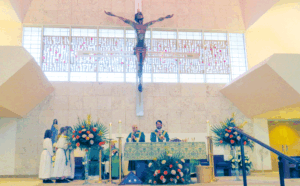Holy Eucharist
The sacrament of the Holy Eucharist
What is the Sacrament of the Holy Eucharist?
The Holy Eucharist completes the Christian initiation that also includes the sacraments of Baptism and Confirmation. It is not only the fountain of all graces and blessings, “it is the source and summit of the Christian life” (134 Lg11).
The term Holy Eucharist comes from the Greek words ‘eucharistein’ and ‘eulogein’ that recall the Jewish blessings that proclaim – especially during a meal – God’s saving works: creation, redemption and sanctification.
Who instituted the Sacrament of the Holy Eucharist?
Our Lord Jesus Christ himself instituted the Eucharistic sacrifice of his Body and Blood at the Last Supper with His chosen disciples (Matthew 26:26-28) in order to perpetuate His would be Sacrifice of the Cross throughout the ages until He should come again in glory (Catechism of the Catholic Church 1323).It is His greatest gift because in this sacrament we receive the very person of Jesus Christ, His divinity and humanity, through the consecrated host and wine. This mystery is called “transubstantiation” as revealed to St. Thomas Aquinas.
What is ‘transubstantiation’ ?
After the consecratory prayers over the bread and wine, every crumb of the consecrated host and every drop of the consecrated wine that we receive in the Holy Communion is indeed the Body and Blood of Christ; the whole Christ himself, although the physical characteristics of the bread and the wine remained unchanged.
How come the Holy Eucharist is called a Holy Sacrifice?
Every celebration of the Holy Eucharist makes ever present the merits of the bloody Sacrifice of the Calvary, obtaining definitive redemption for the fallen human race from the all-loving and all-forgiving God (Hebrew 9:12), although this time in a bloodless way. For this reason, everywhere the Holy Eucharist is celebrated, “the one and only sacrificial act of the Cross that took away the sins of the multitude is made ever present” (Hebrew 9:28). Thus fulfilling Christ’s command to His apostles: “Do this in memory of me” (Luke 22:19).
Can a person in a state of mortal sin receive Holy Communion?
The Apostle Paul cautioned the early Christians to refrain from partaking in the breaking of the bread if one is in a state of mortal or serious sin for “the very Body and Blood of Christ could be the cause of one’s own condemnation” (1Corinthians 11:29).
Why do we have to be on time?
Our Lord Jesus Christ Himself is the one who is inviting us to His precious banquet and for this reason alone we should be punctual and in proper attire. Through this, we show our respect as we ready to listen attentively to His Word since we believe that the Holy Eucharist is not only the highest form of worship but also the greatest source of our strength and holiness. The Liturgy of the Word therefore prepare us in participating fully in the sacrificial act of the Holy Eucharist so that one with the officiating priest, we too could worthily elevate our prayers, our supplications, our offerings, and partake in the Holy Communion.
Why wait after Holy Communion and Final Blessing?
Since the Holy Eucharist is also an act of thanksgiving to God, receiving the Final Blessing from the officiating priest is highly recommended as Melchizedek blessed the Israelites. This is the reason why we should refrain from leaving right after the Holy Communion.
What does the dismissal “go in peace” mean?
This spiritual encounter with our Lord Jesus Christ carries a social dimension hence the necessity that we translate this encounter in our daily lives and activities, bringing Him to our respective places of work so that through us, others may experience the presence and love of Christ in their midst. Hence the exhortation: “go in peace.” Through this we could truly and effectively be the “salt of the earth and light of the world” (Matthew 5:13-14).
What is the composition of the Holy Eucharist?
The Holy Eucharist is composed of the Liturgy of the Word and the Liturgy of the Eucharist. Though they are two different parts yet they formed a fundamental unity.
I. The Liturgy of the Word consists of:
a) The Biblical Readings
b) The Responsorial Psalm
c) The Acclamation Before the Gospel
d) The Homily
e) The Profession of Faith
f) The Prayer of the Faithful
II. The Liturgy of the Eucharist consists of:
a) The Preparation of the Gifts
b) The Prayer over the Offerings
c) The Eucharistic Prayer
d) The Communion Rite
e) The Lord’s Prayer
f) The Rite of Peace
g) Holy Communion

